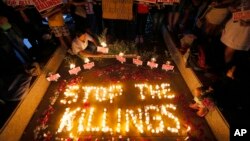A top Philippine official is to face questioning next week at the U.N. Human Rights Council on issues such as extrajudicial killings and vigilante justice alleged to be occurring in President Rodrigo Duterte’s deadly fight against illegal drugs.
The Philippines is one of 14 countries whose records are being examined in the latest session of the Universal Periodic Review, which examines issues in all 193 U.N. member states. Britain is on tap Thursday, and the Philippines’ anti-drug campaign and moves to restore the death penalty are among the issues set for discussion Monday.
Menardo Guevarra, a senior deputy executive secretary in Duterte’s office, is leading the delegation. Also participating is senator and staunch Duterte supporter Alan Peter Cayetano, who told reporters “our strategy is simple: The facts being said about the campaign against drugs are wrong.”
HRW: Denounce war on drugs
Human Rights Watch on Thursday called on the U.N. to denounce the Philippines’ “war on drugs” that it said has left more than 7,000 suspected drug dealers and users dead since Duterte took office June 30 and to urge the country to support an international investigation into the killings.
“The U.N. review of the Philippines is critical because of the sheer magnitude of the human rights calamity since President Duterte took office last year,” said Phelim Kine, Human Rights Watch’s deputy Asia director. “Duterte’s ‘war on drugs’ has been nothing less than a murderous war on the poor.”
Amnesty International Philippines says the review should highlight persisting problems, including the high number of extrajudicial executions and moves to reinstate the death penalty.
Government data
The government is also releasing new data in an attempt to refute death tolls ranging from more than 7,000 to 9,000 cited by human rights groups and the media that were based on previous numbers released by police.
The presidential palace, the Philippine National Police and other government agencies said Tuesday nearly 4,600 people have been killed in drug-related crime since July 1 and more than 1.2 million drug suspects have surrendered.
The government said more than 2,700 suspected drug dealers and users had been killed in police operations and 1,847 homicides had been investigated and found to be drug-related.
Police said 19.6 percent of the country’s 9,432 recorded homicides from July 1 to March 31 were drug-related. About 20 percent of homicides were unrelated to drugs, while the rest are still under investigation.
The higher figures released by police earlier and cited by media and human rights groups included deaths still under investigation, which officials now clarify were not all drug-related.
“The fact that the new PNP figures are inconsistent with the numbers released by the media or human rights organizations on extrajudicial executions, or even their own previous numbers, means that there may be more unreported cases, not less,” said Amnesty International Philippines head Ritz Lee Santos, III.
He said the police should “send a clear message that the state-sponsored unlawful killings of alleged offenders are never justified and are equivalent to extrajudicial executions which they should vow to end.”




